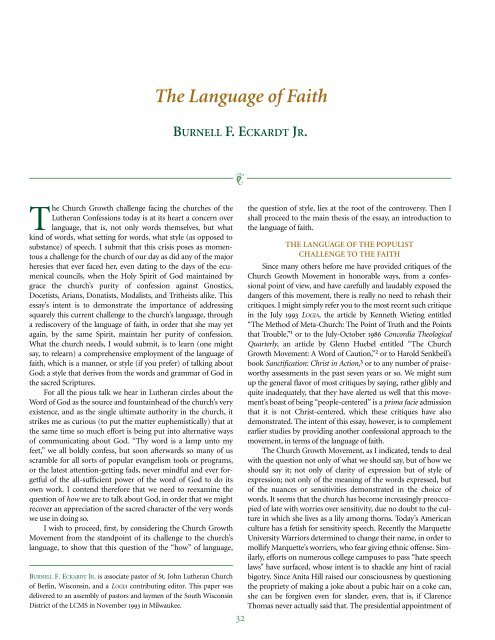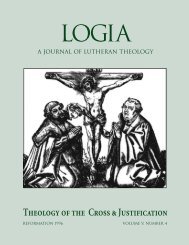04-2 Hermeneutics.pdf
04-2 Hermeneutics.pdf
04-2 Hermeneutics.pdf
- No tags were found...
You also want an ePaper? Increase the reach of your titles
YUMPU automatically turns print PDFs into web optimized ePapers that Google loves.
The Language of FaithBURNELL F. ECKARDT JR.The Church Growth challenge facing the churches of theLutheran Confessions today is at its heart a concern overlanguage, that is, not only words themselves, but whatkind of words, what setting for words, what style (as opposed tosubstance) of speech. I submit that this crisis poses as momentousa challenge for the church of our day as did any of the majorheresies that ever faced her, even dating to the days of the ecumenicalcouncils, when the Holy Spirit of God maintained bygrace the church’s purity of confession against Gnostics,Docetists, Arians, Donatists, Modalists, and Tritheists alike. Thisessay’s intent is to demonstrate the importance of addressingsquarely this current challenge to the church’s language, througha rediscovery of the language of faith, in order that she may yetagain, by the same Spirit, maintain her purity of confession.What the church needs, I would submit, is to learn (one mightsay, to relearn) a comprehensive employment of the language offaith, which is a manner, or style (if you prefer) of talking aboutGod; a style that derives from the words and grammar of God inthe sacred Scriptures.For all the pious talk we hear in Lutheran circles about theWord of God as the source and fountainhead of the church’s veryexistence, and as the single ultimate authority in the church, itstrikes me as curious (to put the matter euphemistically) that atthe same time so much effort is being put into alternative waysof communicating about God. “Thy word is a lamp unto myfeet,” we all boldly confess, but soon afterwards so many of usscramble for all sorts of popular evangelism tools or programs,or the latest attention-getting fads, never mindful and ever forgetfulof the all-sufficient power of the word of God to do itsown work. I contend therefore that we need to reexamine thequestion of how we are to talk about God, in order that we mightrecover an appreciation of the sacred character of the very wordswe use in doing so.I wish to proceed, first, by considering the Church GrowthMovement from the standpoint of its challenge to the church’slanguage, to show that this question of the “how” of language,BURNELL F. ECKARDT JR. is associate pastor of St. John Lutheran Churchof Berlin, Wisconsin, and a LOGIA contributing editor. This paper wasdelivered to an assembly of pastors and laymen of the South WisconsinDistrict of the LCMS in November 1993 in Milwaukee.32the question of style, lies at the root of the controversy. Then Ishall proceed to the main thesis of the essay, an introduction tothe language of faith.THE LANGUAGE OF THE POPULISTCHALLENGE TO THE FAITHSince many others before me have provided critiques of theChurch Growth Movement in honorable ways, from a confessionalpoint of view, and have carefully and laudably exposed thedangers of this movement, there is really no need to rehash theircritiques. I might simply refer you to the most recent such critiquein the July 1993 LOGIA, the article by Kenneth Wieting entitled“The Method of Meta-Church: The Point of Truth and the Pointsthat Trouble,” 1 or to the July-October 1986 Concordia TheologicalQuarterly, an article by Glenn Huebel entitled “The ChurchGrowth Movement: A Word of Caution,” 2 or to Harold Senkbeil’sbook Sanctification: Christ in Action, 3 or to any number of praiseworthyassessments in the past seven years or so. We might sumup the general flavor of most critiques by saying, rather glibly andquite inadequately, that they have alerted us well that this movement’sboast of being “people-centered” is a prima facie admissionthat it is not Christ-centered, which these critiques have alsodemonstrated. The intent of this essay, however, is to complementearlier studies by providing another confessional approach to themovement, in terms of the language of faith.The Church Growth Movement, as I indicated, tends to dealwith the question not only of what we should say, but of how weshould say it; not only of clarity of expression but of style ofexpression; not only of the meaning of the words expressed, butof the nuances or sensitivities demonstrated in the choice ofwords. It seems that the church has become increasingly preoccupiedof late with worries over sensitivity, due no doubt to the culturein which she lives as a lily among thorns. Today’s Americanculture has a fetish for sensitivity speech. Recently the MarquetteUniversity Warriors determined to change their name, in order tomollify Marquette’s worriers, who fear giving ethnic offense. Similarly,efforts on numerous college campuses to pass “hate speechlaws" have surfaced, whose intent is to shackle any hint of racialbigotry. Since Anita Hill raised our consciousness by questioningthe propriety of making a joke about a pubic hair on a coke can,she can be forgiven even for slander, even, that is, if ClarenceThomas never actually said that. The presidential appointment of
















